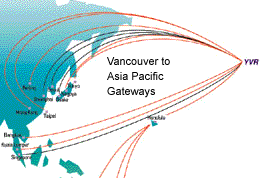|
Regional
Hub status has been
a boon to Tourism
HONG
KONG SAR:
 GLOBAL
HOTEL NETWORK (SM) REPORT: Christopher Khoo, GLOBAL
HOTEL NETWORK (SM) REPORT: Christopher Khoo,
Price Waterhouse Coopers
The Hong Kong Special
Administrative Region owes much of its success as a
premier business and tourist destination to its
position among Asia's most globalized countries.
With a base population of only 7 million people
cramped within a 1,100 square kilometers of space,
the city also pools resources from a large foreign
workforce. The significant presence of foreigners
in HKSAR has remained even after the July 1997
"hand-over" of government reins to China by the
United Kingdom.
COMPETITIVENESS
IS KEY
HKSAR is
well-recognized as one of the best sites in Asia
for multinational corporations to set up regional
headquarters. Hong Kong's competitive advantage
lies in sound economic fundamentals, substantial
fiscal and foreign exchange reserves,
business-friendly government policies, extensive
transport and communications infrastructure, open
and transparent financial markets and a diverse and
well-educated workforce. Latest figures from the
government point to a 20% annual increase to over
3,000 international companies which set up either
regional headquarters or principal offices in
2000.
Rebound in Visitor
Arrivals
HKSAR's pre-eminence as a regional financial
services and trading hub can also be underscored by
its status as among the world's leading aviation
hubs. With a sleek new airport facility in Chek Lap
Kok, HKSAR handled some 25 million passengers in
the January to September 2000 period, ahead of
Bangkok Airport (22 million) and Singapore Changi
Airport (21 million), according to Airport Council
International's latest report. In terms of
international air cargo, Hong Kong is number two in
the world, handling 1.6 million metric tons in the
same period, 17.5% more than last year.
The Hong Kong Tourist
Association (HKTA) has continued to promote Hong
Kong as Asia's premier international and
cosmopolitan city with a unique blend of eastern
and western cultures and traditions. Aside from
tourist attractions such as shopping and
sightseeing, the HKTA has positioned Hong Kong as
the "events capital of Asia" with a myriad of
exhibitions, conventions, and cultural events lined
up each year.
HKSAR tourism industry has
rebounded strongly from the Asian Crisis. Following
two years of decline in 1997 and 1998, visitor
arrivals have rebounded strongly, rising by 14% in
1999. Latest numbers from HKTA indicated that
arrivals totaled 11.8 million visitors in the first
11 months of 2000, 19.4% more than the same period
in 1999. With December visitors expected to also
exceed one million, full year arrivals could easily
surpass 12.8 million, for an annual growth of 17.9%
over 1999. HKSAR's two largest markets are Mainland
China and Taiwan. Trade and employment
opportunities have spurred travel by Mainland
Chinese, which presently accounts for a substantial
36% of arrivals.
Taiwanese visitors, which
makes up 22% of the total number, use HKSAR as a
main transit point to and from key destinations in
Mainland China. Japan and the United States
maintain their market share of 13% and 9%
respectively. According to HKTA, around 49% of
visitors in HKSAR are leisure travelers while
business visitors made up 30% of the total.
___________________________________________
HONG KONG VISITORS
ARRIVAL
1996: 11,702,735
1997: 10,406,261
1998: 9,574,711
1999: 10,678,460
2000E: 11,800,000
Source: Hong Kong Tourist
Association
___________________________________________
Hotels
According to HKTA, since
1997, only five new hotels (1,900 rooms) have
completed in HKSAR. However, HKSAR's current
advantage as the main gateway to Mainland China and
its strengthening economic recovery underpin more
hotel development in the next few years. According
to data from the HKTA, total hotel stock in HKSAR
is projected to expand by an annual average of 6.3%
in the next four years to 45,100 rooms. Future
approved hotel projects include rehabilitation of
old establishments as well as build-ups in new
locations such as Lantau Island.
InformatiOn
courtesy of PATA.
|

